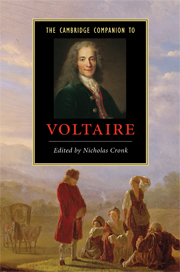Book contents
- Frontmatter
- Introduction
- 1 The making of a name: a life of Voltaire
- 2 Voltaire and authorship
- 3 Voltaire: philosopher or philosophe?
- 4 Voltaire and clandestine manuscripts
- 5 Voltaire and the myth of England
- 6 Voltaire’s masks: theatre and theatricality
- 7 Voltaire as story-teller
- 8 Candide
- 9 Voltaire and history
- 10 Voltaire’s correspondence
- 11 Voltaire: pamphlets and polemic
- 12 Voltaire and the politics of toleration
- 13 Voltaire and the Bible
- 14 The Voltaire effect
- Further reading
- Index
2 - Voltaire and authorship
Published online by Cambridge University Press: 28 May 2009
- Frontmatter
- Introduction
- 1 The making of a name: a life of Voltaire
- 2 Voltaire and authorship
- 3 Voltaire: philosopher or philosophe?
- 4 Voltaire and clandestine manuscripts
- 5 Voltaire and the myth of England
- 6 Voltaire’s masks: theatre and theatricality
- 7 Voltaire as story-teller
- 8 Candide
- 9 Voltaire and history
- 10 Voltaire’s correspondence
- 11 Voltaire: pamphlets and polemic
- 12 Voltaire and the politics of toleration
- 13 Voltaire and the Bible
- 14 The Voltaire effect
- Further reading
- Index
Summary
Voltaire was not simply the most celebrated European author of his day; his celebrity was of a wholly new type. It is impossible to understand the importance and influence of Voltaire's writing without also understanding the sort of writer that he was, or, to be more precise, the idea of the writer that he invented. All authors forge an identity and a sense of self within a literary field, that is to say within a network of institutions and social relationships, and it is through this field that they relate more widely to political authority and to the reading public. This chapter will consider the entirely original manner in which Voltaire constructs his authorial self and strategically manages the creation of his authorial identity.
Voltaire and the status of the writer
In his article 'What is an Author?', Michel Foucault points to the eighteenth century as the decisive moment at which a writer's work became the 'property' of its creator. Writers in the seventeenth century had typically enjoyed independent means or had depended on a pension paid by a person of position. Legislation to grant authors the legal copyright to their works was passed in France during the Revolution - much later than in England - and this meant that from the early nineteenth century writers typically lived off their earnings. The status of the man (and woman) of letters in the eighteenth century is a complex one. On the one hand, a philosophe such as Diderot managed to make a living for himself from the Encyclopédie, though he never became rich; his collaborator, D'Alembert, on the other hand, complained often of poverty, and depended, for example, on a pension from Frederick II.
- Type
- Chapter
- Information
- The Cambridge Companion to Voltaire , pp. 31 - 46Publisher: Cambridge University PressPrint publication year: 2009
- 1
- Cited by

